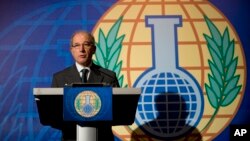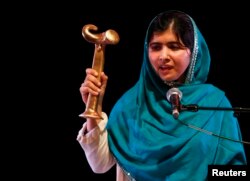The Nobel Peace Prize has been awarded to the Organization for the Prohibition of Chemical Weapons (OPCW), which is currently working to destroy Syria's chemical weapons arsenal.
The Nobel Committee made the announcement Friday in Oslo, recognizing the group for "its extensive efforts to eliminate chemical weapons."
OPCW Director-General Ahmet Uzumcu called the prize a great honor.
"We are a small organization, which for over 16 years and away from the glare of international publicity, has shouldered an onerous but noble task to act as the guardian of the global ban on chemical weapons," he said.
The Hague-based organization was formed in 1997 to enforce the International Chemical Weapons Convention.
The Nobel Committee said in a statement Friday that the work of the OPCW has helped define the use of chemical weapons "as taboo under international law." It said recent events in Syria, where chemical weapons were recently used on civilians,"have underlined the need to enhance the efforts to do away with such weapons."
Syria has acknowledged having chemical weapons and is set to become a member state of the OPCW on Monday.
The OPCW is funded by its member states and has a budget of some $100 million. It employs about 500 people at its headquarters in The Hague, Netherlands. It said it has conducted more than 5,000 inspections in 86 countries, with 100 percent of the declared chemical weapons stockpiles inventoried and verified.
U.S. Secretary of State John Kerry praised the selection of the OPCW, saying that it has taken "extraordinary steps" in Syria to address a "blatant violation of international norms."
United Nations Secretary-General Ban Ki-moon also congratulated the OPCW but said its work was far from done.
"This recognition occurs nearly 100 years after the first chemical attack and 50 days after the appalling use of chemical weapons in Syria. Tragically, the threat of chemical weapons remains a clear and present danger. The OPCW has a specific task to eliminate the chemical weapons and prevent them from ever re-emerging," he said.
But the choice is also meeting with criticism.
Salman Shaikh, director of the Brookings Institution Doha Center tweeted Friday, "Let's face it. Kerry,Lavrov and Assad helped OPCW win. I doubt many folks knew much about OPCW before."
And Nadim Houry, director of the Beirut office for Human Rights Watch tweeted, "I would have thought 2013 would have been a year for soul searching at OPCW, not accolades."
This year's selection was considered a surprise. Malala Yousafzai, a 16-year-old activist for Pakistani women's education, was seen as a favorite to win the award. On Thursday she won the European Union's Sakharov Prize for Freedom of Thought.
Past Nobel Peace laureates include the European Union, U.S. President Barack Obama, Burmese democracy leader Aung San Suu Kyi, and Polish trade union organizer Lech Walesa.
Prizes for achievements in science, literature and peace were first awarded in 1901 in accordance with the will of inventor and businessman Alfred Nobel.
The Nobel Committee made the announcement Friday in Oslo, recognizing the group for "its extensive efforts to eliminate chemical weapons."
OPCW Director-General Ahmet Uzumcu called the prize a great honor.
"We are a small organization, which for over 16 years and away from the glare of international publicity, has shouldered an onerous but noble task to act as the guardian of the global ban on chemical weapons," he said.
The Hague-based organization was formed in 1997 to enforce the International Chemical Weapons Convention.
2013 Nobel Peace Prize
2013 Nobel Prize for Peace
Awarded to the Organization for the Prohibition of Chemical Weapons
- Group recognized for its efforts to eliminate chemical weapons
- Currently overseeing the destruction of chemical weapons in Syria
- OPCW came into force in 1997 as the implementing body of the Chemical Weapons Convention
- It has 189 member states
- Has conducted thousands of inspections around the world
Syria has acknowledged having chemical weapons and is set to become a member state of the OPCW on Monday.
The OPCW is funded by its member states and has a budget of some $100 million. It employs about 500 people at its headquarters in The Hague, Netherlands. It said it has conducted more than 5,000 inspections in 86 countries, with 100 percent of the declared chemical weapons stockpiles inventoried and verified.
U.S. Secretary of State John Kerry praised the selection of the OPCW, saying that it has taken "extraordinary steps" in Syria to address a "blatant violation of international norms."
United Nations Secretary-General Ban Ki-moon also congratulated the OPCW but said its work was far from done.
"This recognition occurs nearly 100 years after the first chemical attack and 50 days after the appalling use of chemical weapons in Syria. Tragically, the threat of chemical weapons remains a clear and present danger. The OPCW has a specific task to eliminate the chemical weapons and prevent them from ever re-emerging," he said.
But the choice is also meeting with criticism.
Salman Shaikh, director of the Brookings Institution Doha Center tweeted Friday, "Let's face it. Kerry,Lavrov and Assad helped OPCW win. I doubt many folks knew much about OPCW before."
And Nadim Houry, director of the Beirut office for Human Rights Watch tweeted, "I would have thought 2013 would have been a year for soul searching at OPCW, not accolades."
This year's selection was considered a surprise. Malala Yousafzai, a 16-year-old activist for Pakistani women's education, was seen as a favorite to win the award. On Thursday she won the European Union's Sakharov Prize for Freedom of Thought.
Past Nobel Peace laureates include the European Union, U.S. President Barack Obama, Burmese democracy leader Aung San Suu Kyi, and Polish trade union organizer Lech Walesa.
Prizes for achievements in science, literature and peace were first awarded in 1901 in accordance with the will of inventor and businessman Alfred Nobel.






